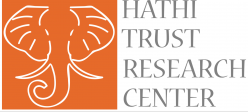This fall we are piloting the workshop curriculum at all five partner institutions. In this post, librarian Leanne Nay shares her thoughts after leading a second DDRF workshop at Indiana University Bloomington. Feedback from all of the partners along with the assessment forms collected from attendees will inform development of our next iteration of workshop materials for spring 2017. You can read more about the modular DDRF curriculum in this update.
Q. Was there anything that worked particularly well in the workshop?
A. We were lucky to have three presenters for our workshop. My colleague Nicholae Cline is very articulate and did a fantastic job of presenting some of the background information and history of the HTRC. I have a lot of experience with hands-on technology workshops, so I enjoyed leading the activities. We were also joined by Ewa Zegler-Poleska, our IDEASc fellow, who offered a fresh perspective on the Bookworm tool and also added her own expertise in discussing data management. Our three voices are very different, but complementary. I think it added a nice variety and helped to keep our participants engaged.
Q. Was there anything that surprised you during the workshop?
A. Our attendees were much different than we expected and attendance was fairly low. When we held a pilot workshop earlier this year the attendees were mostly librarians or library staff with little to no previous experience with text analysis. This time around it was a mixed bag and all the participants had already worked on their own DH projects. In the future we plan to reach out to students in our library science program and potentially lead the workshop during a class session. We hope this will get us closer to our target audience of librarians (and future librarians) who are curious about text analysis but not sure how to get started.
Q. If you could change one thing that you did in the workshop to make the sessions more effective, what would it be?
A. We’d like to incorporate more open-ended activities that challenge our participants intellectually. The current activities are great for exposing people to the steps involved in text analysis and introducing new tools, but they don’t leave much room for creativity.
Q. What tips would you give to somebody else teaching similar workshops?
A. The best advice I can give is to run through all of the materials beforehand, slide-by-slide, in the space where you will be offering your workshop. At Indiana we piloted a new activity using OpenRefine. We installed the software beforehand and it looked like everything was all set, but when I tested the activity in our computer lab the day before our workshop I realized that we didn’t have administrative privileges to save files. The work-around was easy enough, but I wouldn’t have been able to troubleshoot this in a front of a live audience! If you’re working in a campus computer lab you’re likely to run into issues with downloading software, so it’s best to test this out before the workshop.
Q. How would you encourage a fellow librarian to play a more active role in supporting data-driven research?
A. I think the best way to start is by attending workshops or lectures like these. At Indiana University we have a fantastic lecture series called the Digital Library Brown Bags, where librarians and scholars share digital projects that they’re engaged in. It’s inspiring to hear what our colleagues are working on and it helps to add some context to specific tools that you may have heard of but can’t quite wrap your head around.
